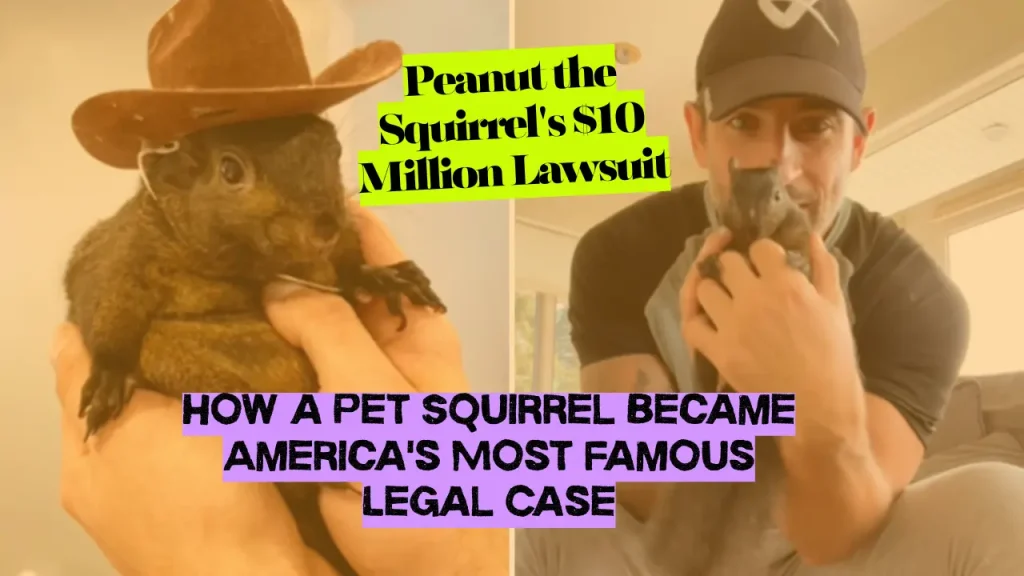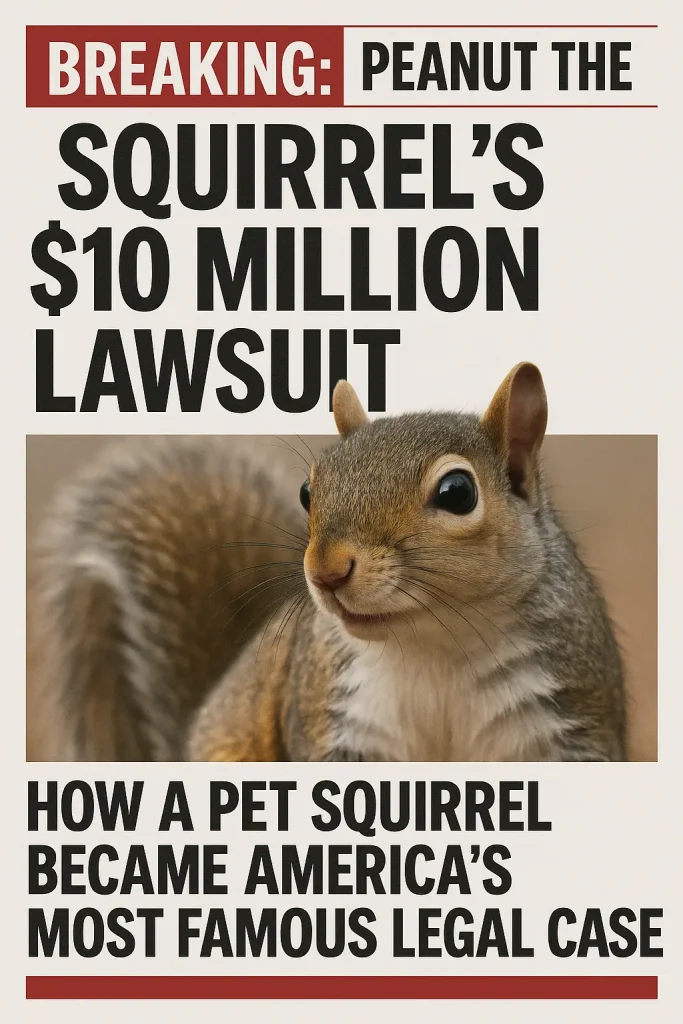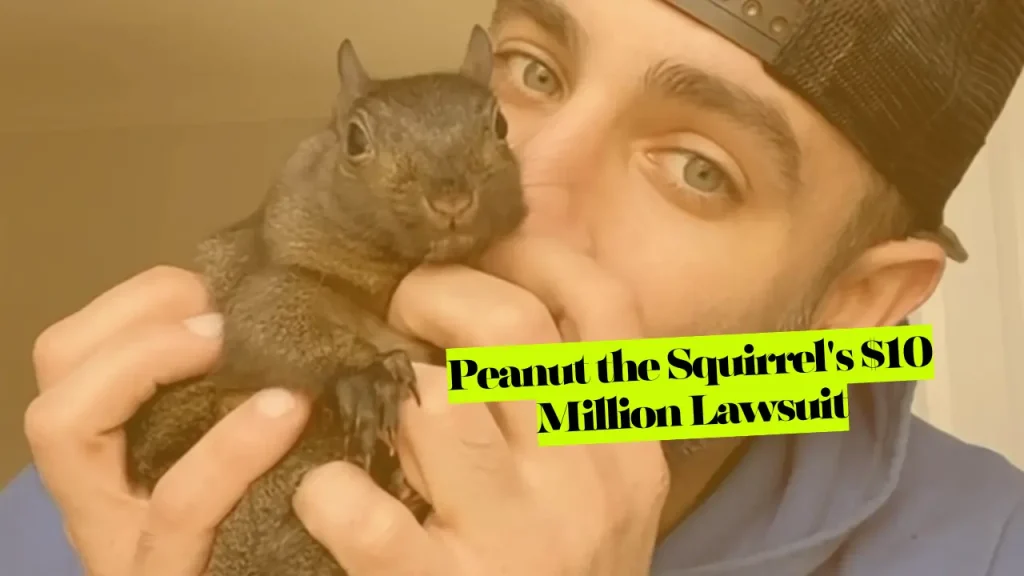Breaking, Peanut the Squirrel’s $10 Million Lawsuit – How a Pet Squirrel Became America’s Most Famous Legal Case
In what may be the most unusual lawsuit to capture America’s attention in 2025, the owners of Peanut (P’Nut) the Squirrel have filed a $10 million legal claim against New York State following the tragic seizure and euthanization of their internet-famous pet. This extraordinary case has sparked national outrage, legislative changes, and even discussions among Supreme Court justices about government overreach.
What started as a heartwarming story of a rescued squirrel becoming an internet sensation has transformed into a landmark legal battle that’s redefining animal rights, due process protections, and the limits of state authority. If you’ve been following this viral story, here’s everything you need to know about the legal proceedings that have captivated millions worldwide.
Table of Contents
The Extraordinary Story Behind America’s Most Talked-About Lawsuit
From Rescue to Internet Fame
Peanut (c. 2017 – c. October 30, 2024), also known as P’Nut, was a male eastern gray squirrel. Found and rescued as a kit by Mark Longo in 2017, he was the subject of a popular Instagram account.
For seven years, Peanut lived peacefully with Mark Longo and Daniela Bittner, bringing joy to millions through social media. Peanut happily lived with him for 7 years, spreading joy on the internet with funny and wholesome videos, becoming his best friend in the process.
The beloved squirrel had amassed a massive following on social media platforms, with fans worldwide charmed by his playful antics and unique bond with his human family.
The Fateful Day: October 30, 2024
On October 30, 2024, Peanut was seized from Longo’s home by the New York State Department of Environmental Conservation and euthanized soon after for rabies testing, which yielded negative results.
The raid that changed everything wasn’t just about Peanut. Peanut and one of the couple’s pet raccoons were taken away … both have since been euthanized as a result of rabies testing.
Both animals were killed despite the rabies tests coming back negative, a fact that has become central to the legal arguments challenging the state’s actions.
The $10 Million Legal Battle: Multiple Lawsuits Filed
Primary Federal Lawsuit Against New York State
The owners of P’Nut the Squirrel are suing the State of New York for $10 million, claiming government abuse after their internet-famous pet was euthanized during a state raid.
This substantial claim reflects not just the emotional damage to the owners, but also the significant commercial value that Peanut represented as an internet personality with millions of followers.
Additional State Court Litigation
It comes as Longo and Bittner filed a separate lawsuit on June 27 in Chemung County Supreme Court, against the county, the City of Elmira and 36 people from every level of local and state government which sought unspecified damages through a jury trial.
The comprehensive legal strategy involves multiple jurisdictions and defendants, suggesting the owners are pursuing every possible avenue for justice and accountability.
Legal Documentation Revelations
On Friday, June 27, a 40-page lawsuit was filed in Chemung County Supreme Court. The first of many, according to Longo. Now, Longo says he has documents that could shift the course of the legal proceedings.
The discovery of potentially damaging evidence suggests the case may reveal significant procedural failures or misconduct in how authorities handled the situation.
Related lawsuit: Flo App Users Win $3.5 Million Settlement

Legislative Response: “Peanut’s Law” Emerges
New York’s Legal Reform
The tragic demise of Peanut, along with his raccoon companion Fred, has already catalyzed legislative changes within New York. The newly enacted “Peanut’s Law” ensures that animals receive due process prior to euthanasia.
This landmark legislation represents one of the most unusual instances where a single case involving a pet has directly influenced state law, demonstrating the broader impact of Peanut’s story.
Assemblyman Jake Blumencranz’s Initiative
Assemblyman Jake Blumencranz, Oyster Bay Republican, has introduced an amendment to the state’s environmental conservation law that he’s calling “Peanut’s Law: Humane Animal Protection”
The bipartisan support for these reforms indicates the case has transcended typical political divisions, uniting lawmakers around animal welfare concerns.
Mark Longo’s Legislative Advocacy
Mark Longo, owner of Peanut the Squirrel, was in Albany this week to support a new law that would protect the welfare of wildlife in human custody.
Longo’s transformation from grieving pet owner to legislative advocate demonstrates how personal tragedy can drive systemic legal change.
Related Lawsuit: Mount Sinai Class Action Lawsuit
Supreme Court Attention: Government Overreach Concerns
Justice Neil Gorsuch’s Commentary
The death of Peanut, a squirrel euthanized after being seized by New York state authorities over rabies fears, was discussed by Supreme Court Justice Neil Gorsuch during a dinner hosted by the Federalist Society on Thursday. Addressing the audience about what he perceives as government overreach
The fact that a Supreme Court Justice has publicly referenced this case elevates it from a simple animal rights dispute to a broader constitutional discussion about the limits of government power.
This unprecedented judicial commentary suggests the case may have implications far beyond animal welfare, potentially influencing how courts view due process protections in administrative actions.
Related Lawsuit: Kat Von D Tattoo Lawsuit, Celebrity Artist Wins Ground breaking Copyright Lawsuit
Legal Grounds and Constitutional Arguments
Due Process Violations
The central legal argument in the Peanut lawsuit centers on alleged violations of due process rights. The owners contend that:
- They were not given adequate notice before the seizure
- No opportunity was provided to contest the action before it occurred
- The animals were killed without proper procedural safeguards
- The negative rabies test results vindicate their position that the seizure was unnecessary
Fourth Amendment Search and Seizure Claims
The raid on Longo’s property raises significant constitutional questions about:
- Whether authorities had probable cause for the search
- The scope and manner of the seizure operation
- Potential violations of reasonable expectation of privacy
- The proportionality of the state response to the alleged violation
Property Rights and Emotional Distress
Legal experts note that the case involves complex questions about:
- Whether pets constitute property with compensable value
- The extent to which emotional distress damages apply to animal cases
- Commercial value of internet-famous animals
- Precedents for significant monetary awards in pet-related litigation

Unusual Legal Complications: The Binance Connection
Intellectual Property Disputes
Mark Longo, owner of Peanut the Squirrel, threatens Binance with a lawsuit over unauthorized use of his IP, including the PNUT trademark
This additional legal battle demonstrates the complex commercial implications of Peanut’s fame, as cryptocurrency markets created tokens based on the squirrel’s story without permission.
The intellectual property disputes add another layer to the legal saga, potentially increasing the overall financial stakes involved in protecting Peanut’s legacy.
Ongoing Harassment and Additional Claims
Continued State Targeting Allegations
Mark Longo — who owned now-deceased Peanut the Squirrel — has lawyered up and is demanding answers from the state of New York … or at the very least an apology for what authorities put him through, claiming he’s been targeted for harassment.
These allegations suggest the legal battle extends beyond the initial seizure, potentially involving ongoing retaliation or harassment by state authorities.
Expert Analysis: Why This Case Matters
Animal Rights Legal Precedent
Legal scholars note that the Peanut case could establish important precedents regarding:
- Due process rights in animal seizure cases
- Commercial value recognition for internet-famous pets
- Constitutional protections for exotic animal ownership
- Limits on state authority in animal welfare enforcement
Government Overreach Implications
Constitutional law experts emphasize that the case raises broader questions about:
- Administrative agency accountability
- Proportionality in government enforcement actions
- Public safety justifications for intrusive government action
- The balance between animal welfare and individual rights
Social Media and Legal Value
The case represents one of the first major legal battles to address:
- How internet fame translates to legal compensation
- Commercial rights of viral animal personalities
- Social media platform responsibilities in animal cases
- Digital age property rights involving pets
Public Response and Cultural Impact
National Outrage and Support
Peanut’s death created an outcry on social media, condemnation from various lawmakers, and the introduction of a bill aimed at preventing similar incidents in the future.
The massive public response demonstrates how animal welfare cases can mobilize political action and legal reform in unprecedented ways.
Celebrity and Political Commentary
The case has attracted attention from various public figures, politicians, and celebrities, transforming a personal tragedy into a national conversation about government authority and animal rights.
Internet Memorialization
Peanut’s legacy continues to grow online, with fans creating memorials, artwork, and continuing to share content celebrating the beloved squirrel’s life and impact.
Potential Legal Outcomes and Implications
Settlement Possibilities
Legal experts suggest several potential outcomes:
- Monetary Settlement: New York State might agree to a substantial financial settlement to avoid prolonged litigation and negative publicity
- Policy Changes: Comprehensive reforms to animal seizure procedures beyond the current legislative initiatives
- Admission of Error: Rare but possible acknowledgment of procedural failures in the case
Trial Scenarios
If the case proceeds to trial, potential outcomes include:
- Significant Damage Award: Juries might award substantial compensation given the emotional and commercial value involved
- Constitutional Ruling: Courts might establish new precedents regarding due process in animal cases
- Government Immunity: State defendants might successfully claim qualified immunity or sovereign immunity protections
Appeal Likelihood
Regardless of initial outcomes, this case appears destined for appellate review given:
- The novel legal questions involved
- Significant monetary stakes
- Constitutional implications
- Public interest and attention

Frequently Asked Questions
What exactly is the Peanut the Squirrel lawsuit about?
The lawsuit centers on the October 30, 2024, seizure and euthanization of Peanut (P’Nut), an internet-famous squirrel, by New York State authorities. Mark Longo and Daniela Bittner are suing for $10 million, claiming government abuse and due process violations after their beloved pet was killed during a state raid, despite rabies tests coming back negative.
How much money are Peanut’s owners seeking in the lawsuit?
The owners have filed a $10 million lawsuit against New York State, plus additional unspecified damages in a separate lawsuit against local and state officials. The substantial amount reflects both the emotional trauma and the significant commercial value that Peanut represented as an internet celebrity with millions of followers.
Why was Peanut the Squirrel seized by authorities?
Peanut was seized by the New York State Department of Environmental Conservation over rabies fears. However, the rabies testing came back negative, which has become a central point in the legal challenge against the state’s actions.
What is “Peanut’s Law” and how does it relate to the lawsuit?
“Peanut’s Law” is legislation introduced in New York that ensures animals receive due process prior to euthanasia. The law was directly inspired by Peanut’s case and represents a significant legal reform aimed at preventing similar incidents in the future.
Has a Supreme Court Justice really commented on this case?
Yes, Supreme Court Justice Neil Gorsuch discussed Peanut’s death during a Federalist Society dinner, addressing what he perceives as government overreach. This unprecedented judicial commentary elevates the case to constitutional significance beyond simple animal welfare concerns.
What makes this lawsuit so unusual?
This case is extraordinary because it involves a viral internet-famous squirrel, has sparked legislative changes, attracted Supreme Court attention, resulted in cryptocurrency disputes, and raises novel questions about the legal value of social media-famous animals and due process rights in animal seizure cases.
Are there multiple lawsuits related to Peanut the Squirrel?
Yes, the owners have filed multiple lawsuits: a $10 million federal lawsuit against New York State, a separate lawsuit in Chemung County Supreme Court against 36 local and state officials, and Mark Longo is also threatening legal action against Binance over unauthorized use of Peanut’s intellectual property.
What are the main legal arguments in the lawsuit?
The primary legal arguments include due process violations (lack of adequate notice and opportunity to contest), Fourth Amendment search and seizure violations, property rights violations, and claims for emotional distress and loss of commercial value from Peanut’s internet fame.
Could this case set legal precedents?
Yes, legal experts believe this case could establish important precedents regarding due process rights in animal seizure cases, commercial value recognition for internet-famous pets, constitutional protections for exotic animal ownership, and limits on state authority in animal welfare enforcement.
What evidence do the owners have to support their case?
The owners claim to have discovered documents that could “shift the course” of the legal proceedings, suggesting potential evidence of procedural failures or misconduct by authorities. The negative rabies test results also support their argument that the seizure and euthanization were unnecessary.
How has the public responded to Peanut’s case?
The case has generated massive public outcry on social media, condemnation from various lawmakers, celebrity commentary, and widespread support for the owners. The public response has been instrumental in driving legislative changes and maintaining national attention on the case.
What happens next in the legal proceedings?
The case is progressing through multiple courts, with ongoing discovery and potential settlement discussions. Given the novel legal questions and public attention, the case appears likely to continue for an extended period and potentially reach appellate courts regardless of initial trial outcomes.
Is there any connection between this case and cryptocurrency?
Yes, Mark Longo is also pursuing legal action against Binance over the unauthorized use of Peanut’s intellectual property, including PNUT cryptocurrency tokens that were created based on the squirrel’s story without permission from the owners.
What impact could this lawsuit have on animal welfare laws?
The case has already led to “Peanut’s Law” in New York and could influence animal welfare legislation nationwide. It may establish new standards for due process in animal seizure cases and reshape how authorities approach wildlife-in-captivity situations.
Looking Forward: The Broader Implications
Legal System Evolution
The Peanut the Squirrel lawsuit represents a fascinating intersection of traditional animal law with digital age realities. As internet-famous animals become more common, courts will increasingly need to address questions about their commercial value and the rights of their owners.
Government Accountability
This case serves as a powerful reminder that government agencies must follow proper procedures, even in seemingly routine animal welfare situations. The massive public attention has transformed what might have been a minor administrative action into a major constitutional case.
Animal Rights Movement
Regardless of the ultimate legal outcome, Peanut’s story has already advanced animal welfare protections and raised public awareness about the need for due process in animal-related government actions.
Conclusion: A Case That Changed Everything
The $10 million Peanut the Squirrel lawsuit has evolved from a personal tragedy into a landmark legal case with implications far beyond animal welfare. “This is our opportunity to make change and seek justice for P’Nut and Fred,” Mark Longo told the New York Post, summarizing the transformative potential of this extraordinary litigation.
From Supreme Court commentary to legislative reforms, from cryptocurrency disputes to constitutional questions about government overreach, this case demonstrates how a single incident can catalyze broad legal and social change. The fact that a pet squirrel’s story has captured national attention and influenced lawmakers, judges, and millions of citizens speaks to the power of social media and the deep human connection to animal welfare.
Whether the case results in a substantial monetary settlement, groundbreaking legal precedents, or significant policy reforms, Peanut’s legacy will likely influence animal welfare law and government accountability for years to come. Despite this positive development, the owners contend that no law can revive their beloved pets.
The ongoing litigation serves as both a quest for justice and a powerful symbol of how ordinary citizens can challenge government overreach and create lasting change. As this remarkable case continues to unfold, it remains a testament to the enduring bond between humans and animals, and the lengths people will go to protect those they love.
In an age where viral stories often fade quickly, Peanut the Squirrel’s legal battle has demonstrated lasting power to inspire legislative action, constitutional discussion, and a national conversation about the proper limits of government authority. The ultimate resolution of this $10 million lawsuit will likely be remembered as a pivotal moment in animal welfare law and due process protections.
This article is for informational purposes only and does not constitute legal advice. The Peanut the Squirrel lawsuit involves ongoing litigation with developing facts and legal arguments. For specific legal guidance regarding animal welfare cases or government overreach claims, consult with qualified attorneys specializing in constitutional law or animal rights litigation.
About the Author

Sarah Klein, JD, is a licensed attorney and legal content strategist with over 12 years of experience across civil, criminal, family, and regulatory law. At All About Lawyer, she covers a wide range of legal topics — from high-profile lawsuits and courtroom stories to state traffic laws and everyday legal questions — all with a focus on accuracy, clarity, and public understanding.
Her writing blends real legal insight with plain-English explanations, helping readers stay informed and legally aware.
Read more about Sarah
